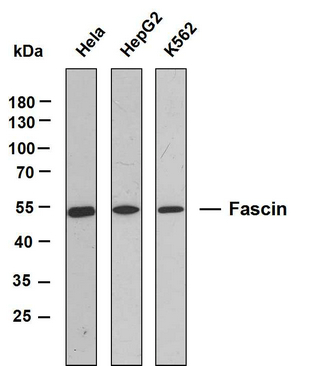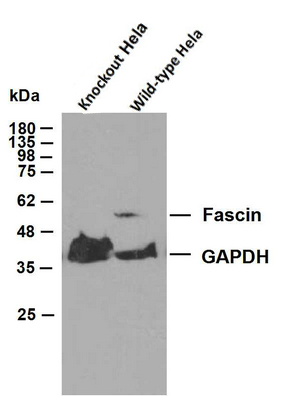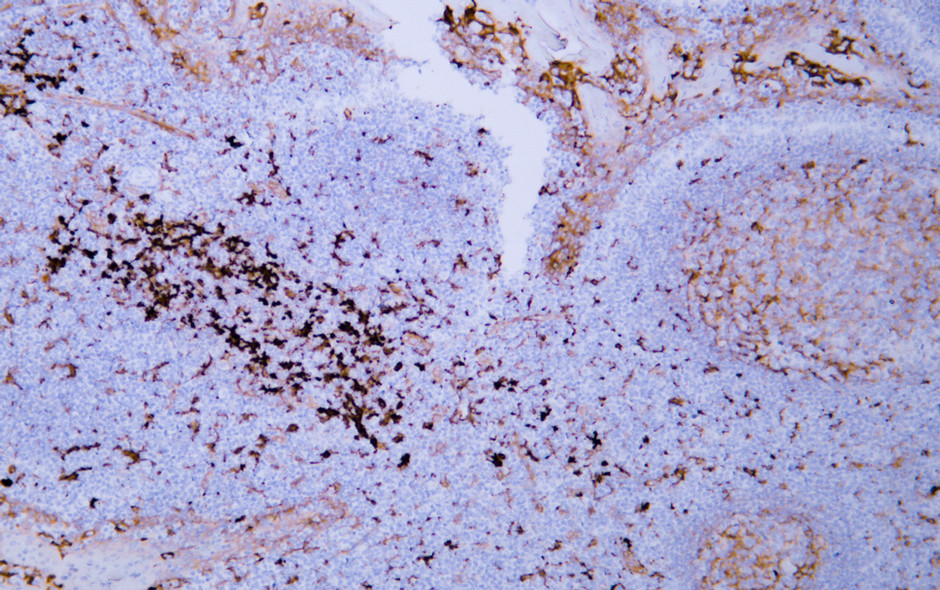Fascin (ABT-FASN) mouse mAb
- Catalog No.:YM6178
- Applications:IHC;WB;ELISA
- Reactivity:Human; Mouse (predicted: Rat)
- Target:
- Fascin
- Fields:
- >>MicroRNAs in cancer
- Gene Name:
- FSCN1 FAN1 HSN SNL
- Protein Name:
- Fascin (55 kDa actin-bundling protein) (Singed-like protein) (p55)
- Human Gene Id:
- 6624
- Human Swiss Prot No:
- Q16658
- Immunogen:
- Synthesized peptide derived from human Fascin AA range: 250-350
- Specificity:
- This antibody detects endogenous levels of human Fascin. Heat-induced epitope retrieval (HIER) TRIS-EDTA of pH8.0 was highly recommended as antigen repair method in paraffin section
- Formulation:
- Liquid in PBS containing 50% glycerol, 0.5% BSA and 0.02% sodium azide.
- Source:
- Mouse, Monoclonal/IgG1, Kappa
- Dilution:
- IHC 1:200-400,WB 1:500-2000, ELISA 1:5000-20000
- Purification:
- The antibody was affinity-purified from mouse ascites by affinity-chromatography using specific immunogen.
- Storage Stability:
- -15°C to -25°C/1 year(Do not lower than -25°C)
- Molecular Weight(Da):
- 55kD
- Background:
- This gene encodes a member of the fascin family of actin-binding proteins. Fascin proteins organize F-actin into parallel bundles, and are required for the formation of actin-based cellular protrusions. The encoded protein plays a critical role in cell migration, motility, adhesion and cellular interactions. Expression of this gene is known to be regulated by several microRNAs, and overexpression of this gene may play a role in the metastasis of multiple types of cancer by increasing cell motility. Expression of this gene is also a marker for Reed-Sternberg cells in Hodgkin's lymphoma. A pseudogene of this gene is located on the long arm of chromosome 15. [provided by RefSeq, Sep 2011],
- Function:
- disease:Marks and mediates breast cancer metastasis to the lungs. FSCN1 is not functionally validated but achieves the highest statistical significance (P less than 0.000001). Those subjects expressing the lung metastasis signature have a significantly poorer lung metastasis-free survival, but not bone metastasis-free survival, compared to subjects without the signature.,function:Organizes filamentous actin into bundles with a minimum of 4.1:1 actin/fascin ratio. Probably involved in the assembly of actin filament bundles present in microspikes, membrane ruffles, and stress fibers.,PTM:Phosphorylation on Ser-39 inhibits the actin-binding ability of fascin.,similarity:Belongs to the fascin family.,subunit:Associates with beta-catenin.,tissue specificity:Ubiquitous.,
- Subcellular Location:
- Cytoplasmic
- Expression:
- Ubiquitous.
- June 19-2018
- WESTERN IMMUNOBLOTTING PROTOCOL
- June 19-2018
- IMMUNOHISTOCHEMISTRY-PARAFFIN PROTOCOL
- June 19-2018
- IMMUNOFLUORESCENCE PROTOCOL
- September 08-2020
- FLOW-CYTOMEYRT-PROTOCOL
- May 20-2022
- Cell-Based ELISA│解您多样本WB检测之困扰
- July 13-2018
- CELL-BASED-ELISA-PROTOCOL-FOR-ACETYL-PROTEIN
- July 13-2018
- CELL-BASED-ELISA-PROTOCOL-FOR-PHOSPHO-PROTEIN
- July 13-2018
- Antibody-FAQs
- Products Images

- Various whole cell lysates were separated by 10% SDS-PAGE, and the membrane was blotted with anti-Fascin antibody. The HRP-conjugated anti-Mouse IgG antibody was used to detect the antibody. Predicted band size: 55 kDa
.jpg)
- Human Hodgkin lymphoma tissue was stained with Anti-Fascin (ABT-FASN) Antibody
.jpg)
- Human Hodgkin lymphoma tissue was stained with Anti-Fascin (ABT-FASN) Antibody

- Various whole cell lysates were separated by 10% SDS-PAGE, and the membrane was blotted with anti-Fascin and anti-GAPDH antibody. The HRP-conjugated anti-Mouse IgG antibody was used to detect the antibody. Lane 1 : Fascin knockout Hela cell lysate Lane 2 : Wide type Hela cell lysate Predicted band size: 55 kDa

- Human tonsil tissue was stained with Anti-Fascin (ABT-FASN) Antibody

- Human tonsil tissue was stained with Anti-Fascin (ABT-FASN) Antibody



